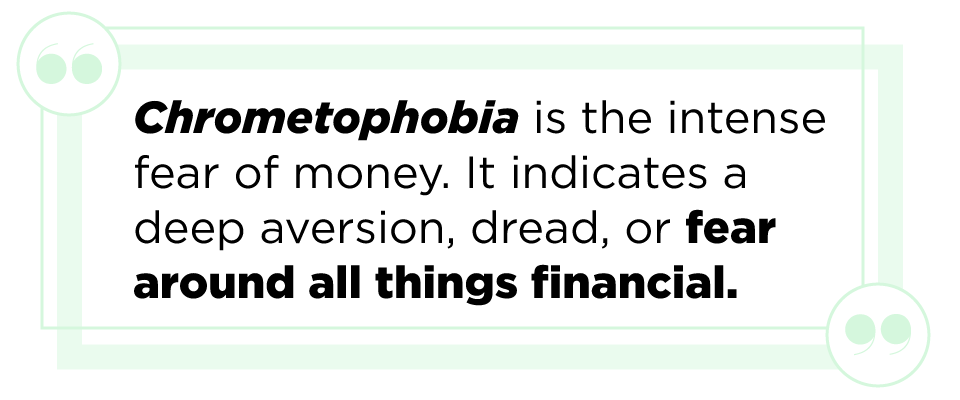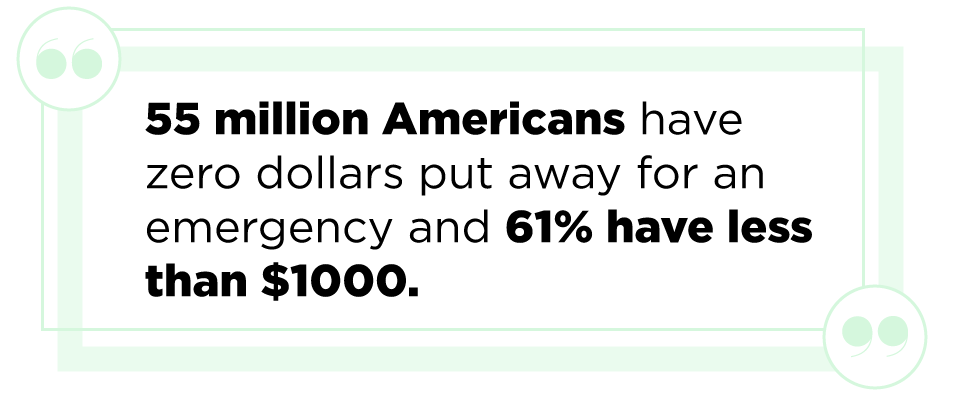Money is scary (sure, but it doesn't have to be!)
Throughout our entire education, we learn math. We start with counting, usually with objects. From there, we count coins, learn how to add and subtract, then we go on to more—er—complicated aspects like trigonometry, various levels, of algebra, and statistics.
One thing we don't really learn? How to use math to manage our money. By the time we are out on our own, earning a paycheck, we are left to wonder, how the heck am I supposed to
manage my money?
Why Women Fear Money
It doesn't help that we are inundated with a message of "buy! buy! buy!" Even if you live in a small town in the most rural area on an island in the middle of a large lake, you can still scroll
Instagram—and those new shopping features! You can probably still get Amazon to airdrop something to your house. So, it's no wonder money is scary.
Here's an alarming fact. More than 50 percent of women admit that they never
discuss personal finances with friends, even though 28 percent report feeling stressed about money every single day. I think anyone can empathize with that all-too-common feeling of your head hitting your pillow only to watch your money fears loom right above you.
It's no big surprise that many women have fear or discomfort associated with money. It's not that long ago that women weren't even able to have their own bank accounts. Couple that recent history with the constant societal blabber around women being "shopaholics" or "foolish with money."
In many ways, we are set up to believe that we are
bad with money. Forget that.
Letting Go of Our Fear of Money
So we've covered the lack of general education, low societal expectations, and the ever-present pressure to spend (and spend! and spend!). We won't even get into the whole
wellness and beauty industry that is tailored specifically to haunt and berate us.
So, how do we let go of this long-held fear of the almighty dollar?
Here's our three-step process to get started. Listen, it's not easy, but it's important, so let's do it!
1. Identify Your Money Fears
Chrometophobia is the intense fear of money. It indicates a deep aversion, dread, or fear around all things financial. Also, it's incredibly common.
While you may not necessarily be money-phobic, many feel unease or discomfort speaking about money—or asking for it. When you feel intimidated or scared about asking for a raise (even though you know you deserve it,) this is some classic money fear manifestation.
To start, if you’re not pleased with where you are financially-speaking, identify what motivates you when it comes to money and what’s getting in your way—what are the emotional stumbling blocks that are keeping you from financial freedom?
Examine the sources of your fear to begin to combat them, For example, why is it that you are afraid to
ask for a salary increase? Is it because you're afraid you will lose your job? Or are you afraid you haven't comfortably hit the goals you need to present a great case for a raise?
Whatever it is, you can work it out. If it's that pesky
impostor syndrome speaking, work to put together a case for why you 100 percent absolutely deserve that raise. If the worry stems from the worry that you're not "quite there" yet, get to
making some goals. Once you've achieved those, go for it.
The same thing goes for looking at your overall finances. Why are you afraid to look at your credit card balance or your student loan debt? Take a look. Get a 360-degree view to better understand your next steps.
2. Honestly Assess Your Finances
Just like anything daunting, the biggest impediment to actually
taking care of your finances is in starting out. Being afraid to look at your finances honestly and directly is hard. So, what do we do instead? We save it for later. We buy the new sweater on a credit card. We move into the nice place (with higher rent) and we continue to accrue debt.
Living in the dark allows for a few quick wins (hello retail therapy!) but it hurts you, big-time, in the long run. So, here's how to honestly assess your current state. We promise it will only hurt for a minute.
- Collect all the balances from all of your accounts
- Check interest rates on each card
- Check your credit score and run a credit analysis. You might even have an account you forgot existed!
- Research payment reductions, balance transfers, or debt consolidation plans
- Spend time planning how long it will take you to pay off your balances (while building savings)
- Begin this month by vowing not to spend more than you make
There are also tons of resources to help you out. If you use your mobile banking app, it might connect you to your credit score, a monthly analysis of your spending habits (including how much more you spend than you make,) and automatic bill payments to pay down those high-balance, high-interest credit cards.
3. Track Your Spending
It's time to
track your spending across all accounts. This is an incredibly valuable exercise and it might just become part of your monthly routine. Whether you're a spreadsheet, mobile app, or notebook kind of gal, start tracking what you spend, where you spend it, and why.
An important element of tracing your spending is tracking it over a period of time. On a given month, you might have a big family birthday, a best friend's wedding, or another big one-time expense.
Track your spending habits over a period of time to recognize habits—and break them.
For example, if you implement an expense tracking system over your past year of spending, you might find that your takeout spending, clothing shopping, or skincare routine is robbing you of thousands of dollars. Take this look at your spending at a high–and make the next steps accordingly. That's right, make a budget.
In a 2018 survey, Bankrate.com found that 55 million Americans have zero dollars put away for an emergency and 61 percent have less than $1000. Once you start tracking your spending, you can start building your savings. Set up an automatic transfer either on a monthly or per-paycheck basis. Once you've done this—volia!—you have a saving account that is ready to auto-roll.
Want to Make More Money Power Moves?
We love to break things down into manageable steps, but we recognize that building a healthy relationship with money is more than a 1-2-3-step process.
That's why this is one of the major Power Moves we are covering in my book,
Power Moves. Order your copy of
Power Moves, which includes helpful resources like the Power Moves Budgeting Tool, in addition to, teaching you how to pivot, reboot, and build a career of purpose.













